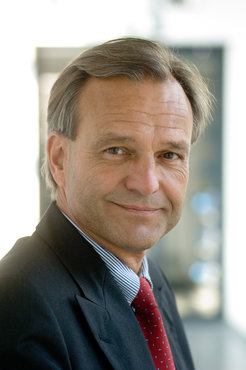Prof. Dr. Karsten Danzmann is admitted to the Akademie der Wissenschaften und der Literatur Mainz
Prof. Dr. Karsten Danzmann is the Director of the Max Planck Institute for Gravitational Physics (Albert Einstein Institute/AEI) and Leader of the Center for Gravitational Physics in Hannover, which is jointly supported by the AEI and the Leibniz Universität Hannover. He will become a full member of the Akademie der Wissenschaften und der Literatur Mainz. This honour was bestowed upon him for outstanding work in the service of science.

Following a ceremony that will not be open to the public, Prof. Danzmann will present the most important projects of gravitational wave astronomy, both in scientific and technological terms. LISA (Laser Interferometer Space Antenna), the gravitational wave observatory in space, is a joint project of ESA and NASA, which, as of 2015, will finally make possible completely new insights into our universe by making access possible to the approximately 96% of the universe that is still unknown and not accessible to current astronomical methods. LISA will be able to measure gravitational waves. Gravitational waves are of great interest to astronomers as carriers of information because they penetrate all areas of the universe without hindrance and may even help to provide new insights into the Big Bang. The earth-based gravitational wave observatories GEO600 and LIGO, in which Prof. Danzmann was involved from the very start, are already operational today, though working on another frequency spectrum than LISA.
“Listening outposts in space,” lecture by Prof. Dr. Karsten Danzmann
on 3.02.2007 at 3.30 pm.
in the Akademiegebäude, Geschwister-Scholl-Straße, Mainz
The lecture takes place within the framework of the Symposium “Society faces future issues – new findings and goals in astrophysics and cosmology” of the Akademie der Wissenschaften und der Literatur Mainz.
At the end of the symposium Prof. Danzmann will be available for questions.
Akademie der Wissenschaften und der Literatur Mainz
The organization was founded on 9 July 1949 in Worms as an association of scholars and literary figures. Following in the footsteps of Gottfried Wilhelm Leibniz, the Academy has set itself the task of cultivating both scholarship and literature in order to preserve and promote culture. It is, on the one hand, an interdisciplinary scholarly society that transcends national boundaries. On the other hand, it promotes research projects of various types and organizes scholarly conferences and symposia. The focus of the Academy’s work is long-term basic research. In particular, its research emphasis in mathematics and the natural sciences is in the long-term observation and collection of data.
Karsten Danzmann
Worldwide, Karsten Danzmann enjoys an excellent reputation due to his scientific activities and his personal commitment to experimental gravitational wave research and scientists engaged therein. He was, and still is, involved in the development of the Max Planck Institute for Gravitational Physics in Hannover and in the construction and operation of the German-British GEO600 gravitational wave detector in Ruthe near Hannover. In addition, Danzmann is responsible for the European role in the development and implementation of the Laser Interferometer Space Antenna (LISA) mission.
Karsten Danzmann, born in Rotenburg/Wümme in 1955, studied physics at the Clausthal University of Technology and at the Leibniz Universität Hannover, where he completed his doctoral studies in 1980. After stays at the Physikalisch-Technische Bundesanstalt in Berlin, the Max Planck Institute for Quantum Optics in Garching, and Stanford University, USA, he was appointed Professor at the Leibniz Universität Hannover in 1993. From 1994 to 2001 Danzmann was the Director of the external site of the Max Planck Institute for Quantum Optics, which in 2001 was transformed into the site of the Max Planck Institute for Gravitational Physics. Since 2002 he has been active as the Director of the newly founded Max Planck Institute for Gravitational Physics (Albert Einstein Institute) in Hannover.












